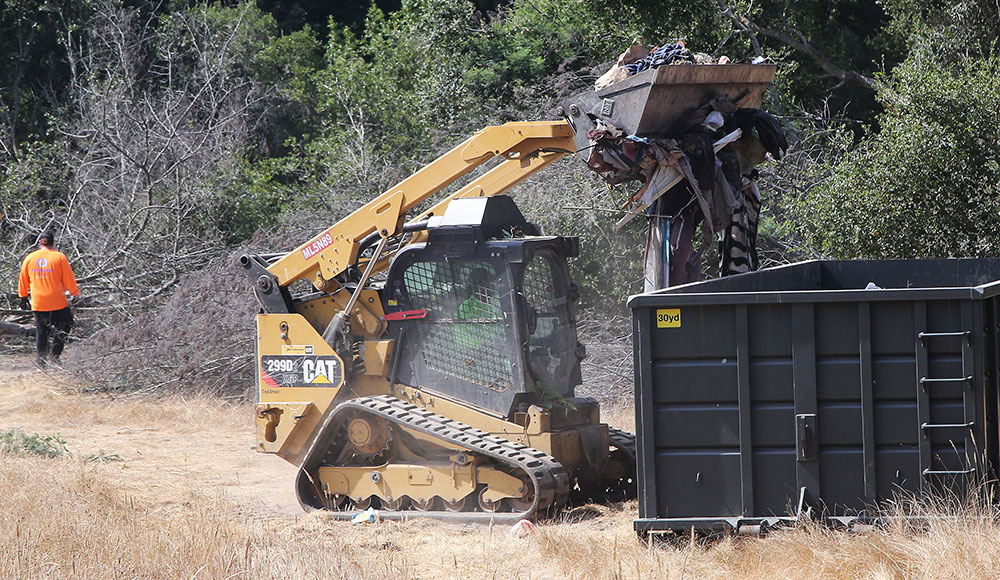Days after Gov. Gavin Newsom issued an executive order directing jurisdictions throughout the state to address the homeless encampments within their borders—and about one month after the U.S. Supreme Court ruled that laws banning sleeping in public do not constitute cruel and unusual punishment—unsanctioned camps throughout the state have been cleared, and the residents moved to shelters, or to other illicit sites.
On July 29, Santa Cruz Police were in Pogonip Open Space, clearing out several encampments where homeless advocates say an estimated 50 people had been living.
Santa Cruz Homelessness Response Manager Larry Imwalle said the sweep removed about five people, and about 30 encampments that had been abandoned.
Imwalle said that the action was not sparked by Newsom’s announcement or the Supreme Court decision. Rather, officials were looking to clear fire-prone areas as the dry season wanes toward fall.
The sweeps are also necessary, he said, because of the environmental impacts caused by unsanctioned campsites.
More than those reasons, however, was a concern for the unsheltered people.
“They’ve made multiple visits over several weeks trying to engage folks, connect them with services if they’re interested and shelter options in particular,” Imwalle said. “This is how we’ve been approaching the work for over two years. We feel it has gotten some good results. It’s the humane and respectful way to go through this process.”
Meanwhile in Watsonville, officials were continuing to clear homeless encampments along the Pajaro River.

In addition to the deleterious effects of camping along the river, many of the people living along the levee have dug shelters into the soil, which weakens the levee and increases flooding risks, Watsonville Police spokeswoman Michelle Pulido said.
According to Athena Flannery of Homeless United for Friendship and Freedom (HUFF), officials put up notices in the Pogonip area, giving the campers 10 days to pack up and vacate.
That was not nearly enough time, Flannery said, especially for homeless people with few resources, many of whom are disabled.
The population of unhoused people in Pogonip increased recently after officials cleared out campers in the downtown Santa Cruz area and parks such as Harvey West, as well as the area around Coral Street, Flannery said.
Then, they began daily sweeps of those areas to make sure the encampments did not return.
“That was a whole new level of brutal,” Flannery said.
She added that the Homeless Persons Health Project in August will present a letter to the Santa Cruz County Board of Supervisors, asking for a shift in thinking in the way local officials deal with the homeless population.
This includes a “health and safety focused Street Cleaning Encampment Protocol,” and a decrease to the number of police officers that are used to clear encampments. The latter point, the letter states, would save money and be less traumatic for the residents.
“This is an issue of Public Health, not criminal,” the letter states.
In addition, the letter asks the city to store evicted residents’ belongings for at least 90 days. Currently, officials simply dispose of them, giving no chance to claim them, Flannery says.
The Pajaronian has reached out to Santa Cruz Police Department, and to Housing Matters, which provides shelter to many of the county’s homeless people.
In Newsom’s July 25 order, he called for jurisdictions to address homeless encampments while being compassionate to the people living there.
“This executive order directs state agencies to move urgently to address dangerous encampments while supporting and assisting the individuals living in them — and provides guidance for cities and counties to do the same,” Newsom stated. “The state has been hard at work to address this crisis on our streets. There are simply no more excuses. It’s time for everyone to do their part.”
As he prepared to leave Pogonip Monday, Troy Mason said he had been homeless for about five years, and had been kicked out of about 10 different places. He has lost his belongings several times.
“They’re killing us,” Mason said. “We’re Americans. No American should have to be homeless.”















the last quote is the most profound. No American should have to be homeless. the Supreme court, filled with 3 trump appointees, could not care less. justice Thomas could probably house a dozen people in RV he received as a gift for being a good corporate TOADIE.
Watch the Ron DeSantis-newsom debate to discover the real reason california is in dire straits while Florida is thriving.